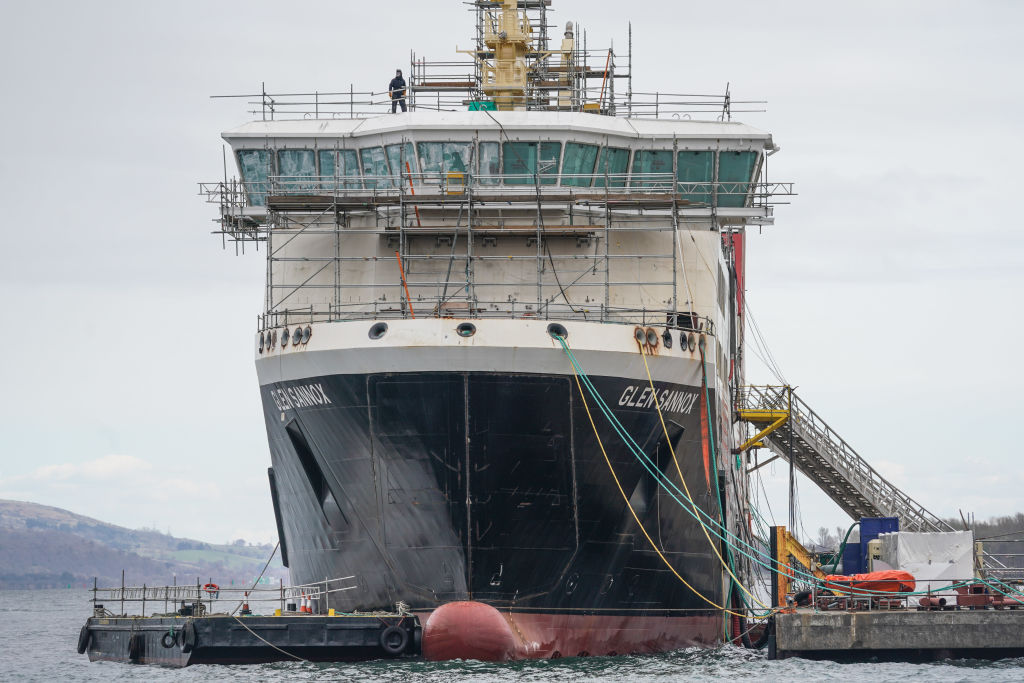‘As first minister I am ultimately accountable for every decision that the Scottish government takes,’ Nicola Sturgeon announced on Friday as she gave evidence to the Scottish parliament’s public audit committee. Scotland’s ferry procurement fiasco is being closely scrutinised, and the latest developments have put Sturgeon’s record under the microscope.
In a performance reminiscent of her evidence session during the Salmond inquiry, the first minister spoke confidently, asserting several times that she was trying her best to be open – while dodging any actual accountability. It was classic Sturgeon.
There have been accusatory murmurings that the Scottish government may have corrupted the ferry procurement process for political reasons. The charge was slapped down by the first minister, who ‘completely and utterly’ refuted any suggestion of political interference in the award of a now notorious contract that went to the Ferguson Marine shipyard in Port Glasgow. The contract has, in short, been a disaster. Its aim was to provide two new ferries for government-owned CalMac Ferries. How are things looking now? Well, the project is five years behind schedule. It may end up costing taxpayers more than three times the original £97 million ‘fixed price contract’ sum.
And that’s before even considering the human toll this has taken on Scotland’s islanders. They have been left struggling to run their businesses and operate day-to-day. Islanders rely significantly on ferries, but those currently in use break down, cutting people off from the mainland. The inhabitants of the inner Hebridean islands of Mull and Iona are so fed up with the blundering efforts of the Scottish government that they are seeking to set up their own social enterprise ferry service.
The debacle started in 2014 when the Scottish government, with Alex Salmond as first minister at the time, stepped in to stop the Ferguson Marine shipyard on the Clyde from going under. Jim McColl, a Scottish billionaire and the owner of Clyde Blowers Capital, a private equity firm that bought Ferguson Marine in 2014, was persuaded to take the yard. The order for two passenger ferries was subsequently secured.
‘If you are saying there was anything untoward in this procurement process,’ Nicola Sturgeon retorted, ‘then absolutely, categorically, not.’
This decision has come under fire. On Friday, Conservative MSP, and member of the public audit committee, Sharon Dowey questioned Sturgeon on whether awarding the contract to one of McColl’s firms was a case of ‘jobs for the boys’.
‘If you are saying there was anything untoward in this procurement process,’ Nicola Sturgeon retorted, ‘in order to somehow inappropriately steer this contract towards Ferguson Marine Engineering Ltd, then absolutely, categorically, not.’
Sturgeon’s cocksure remarks come after a dossier, leaked only a few months ago, suggested foul-play. The dossier was the focus of a bombshell BBC documentary (Disclosure: The Great Ferries Scandal) released in September, which implied that the process of awarding the ferry contract may have been rigged .
Prior to the bidding process for the ferry contract, all bidders received a 125-page specification to work with before they made their offers. All bidders, that is, except Ferguson Marine, which received a 424-page document from a design consultant, setting out CalMac’s technical requirements. This design consultant was the same firm that the Scottish government agency in charge of ferry procurement – Caledonian Maritime Assets Limited (CMal) – had used to help draft the tender pack which went to bidders.
Not only was Ferguson Marine allowed to significantly change its design halfway through the tender process, knocking £10 million off its price, but the company also met with CMal assessors for a ‘confidential’ meeting. No such liberties were afforded to other bidders. CMal confirmed to the BBC that an in-person meeting for the purposes of clarification did take place, but that it believed this was normal and appropriate.
It doesn’t stop there: Ferguson Marine was allowed to go ahead with its bid despite being unable to acquire the usual mandatory financial safeguard, known as a builders refund guarantee, suggesting that CMal may have broken its own rules.
With no such guarantee in place, and despite the yard being the most expensive of seven bids, Scottish ministers nonetheless approved the awarding of the contract to Ferguson Marine. Since then, Audit Scotland have found there is ‘insufficient documentary evidence’ to explain why Scottish ministers accepted the contract risks in 2015.
Contrary to the first minister’s bold assertion then, there appears to be plenty that seems ‘untoward in this procurement process’. There was also the now infamous ‘launch’ of the first boat in 2017, the still unseaworthy MV Glen Sannox with its fake, painted-on windows, which triggered a ‘milestone’ payment of over £1 million to Ferguson Marine. (Audit Scotland subsequently found that such milestone payments were not clearly defined and had no link to quality standards.) A whole book could be written detailing the strange series of events that have taken place throughout the unfolding of the ferry calamity.
All of this raises serious questions about the actions of the Scottish government. Despite staunch denials, the evidence tends to suggest flaws in a procurement process that was only ever going to have one winner. The cost to Scotland is hundreds of millions of pounds wasted, failing ‘lifeline’ ferry services, and a damaged reputation for fairness in government procurement.
To date there have been no resignations and no apology from the First Minister. It’s a strange kind of accountability.







Comments